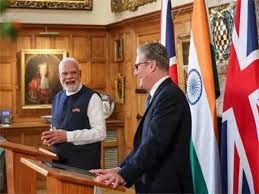India-UK trade deal: Indian textile, gems & jewellery sectors to benefit; medical devices to get cheaper, says PM Modi

India and the United Kingdom have signed a landmark free trade agreement (FTA). The deal aims to boost trade, create jobs, and strengthen economic ties. Prime Minister Narendra Modi called it a “historic milestone” that will open new opportunities for Indian exporters. It will also make British goods, including medical devices, cheaper for Indian consumers.
Indian Textiles and Apparel Gain Big
India’s textile and apparel industry stands among the biggest winners of this deal. The UK has removed tariffs on almost all Indian textile exports. Earlier, tariffs ranged between 4% and 16%, reducing competitiveness.
This change benefits major hubs like Tiruppur, Ludhiana, and Surat. Indian exporters will now compete better with Bangladesh and Vietnam. Cotton garments, silk products, and home textiles will become more affordable in the UK market.
Industry experts predict a 30–40% jump in textile exports over the next few years. The surge will create thousands of jobs, especially for women and rural artisans. This supports India’s goal of becoming a global textile leader.
Jewellery Exports to Shine
India’s gems and jewellery sector will also benefit heavily. The UK has removed customs duties, opening a high-value market for Indian products.
Cities like Surat, Mumbai, and Jaipur, known for diamond cutting and jewellery design, expect a rise in orders. Export organisations forecast that gems and jewellery shipments could double within three years.
This growth will boost small businesses and artisans. Many SMEs that supply raw materials and components will see a surge in demand.
Cheaper Medical Devices and British Goods
Indian consumers will also benefit from the FTA. The government has reduced tariffs on medical devices, making them more affordable.
Diagnostic tools, surgical instruments, and advanced healthcare technology from the UK will now cost less. Hospitals and clinics, particularly in smaller towns, will gain access to modern medical equipment.
Other British goods like cosmetics, beverages, and electronics will also become cheaper. This change will improve product variety and quality in the Indian market.
Opportunities for Skilled Professionals
The trade deal also supports India’s services sector. A major highlight is the double social security exemption. Indian professionals working in the UK temporarily will not need to pay contributions in both countries. This change could save businesses and professionals around ₹4,000 crore annually.
The UK will also simplify visa rules for skilled Indian workers. Chefs, IT professionals, musicians, and yoga instructors will find it easier to work in Britain. This will strengthen cultural and economic ties between the two nations.
MSMEs and Supply Chain Growth
Micro, small, and medium enterprises (MSMEs) are set to gain big. With duty-free access to the UK, many small exporters can directly connect with buyers.
Apparel manufacturers in Tamil Nadu or jewellery artisans in Gujarat can now expand their reach. This wider access is expected to create jobs and improve skill development across India.
Trade Outlook and Economic Impact
Currently, India-UK trade is valued at about $60 billion annually. With this agreement, trade could double to $110–120 billion by 2030.
For the UK, the deal provides access to India’s rapidly growing consumer market. British companies in healthcare, technology, and education will find it easier to operate in India.
Challenges Ahead
While the deal is promising, implementation will be key. Indian exporters must focus on quality, sustainability, and design to fully utilise this opportunity.
The FTA is still awaiting parliamentary approval in both countries. It is expected to take full effect by mid-2026. Tariff reductions will roll out in phases, allowing both nations to adjust.
Conclusion
The India-UK free trade agreement is more than a tariff-cutting measure. It is a roadmap for deeper economic cooperation. Textiles, gems and jewellery, and healthcare sectors are set for major growth.
The deal promises jobs, higher exports, and affordable products for consumers. For India, it strengthens its role as a global manufacturing hub. For the UK, it opens doors to one of the world’s fastest-growing economies.
As PM Modi noted, this partnership is a step toward shared prosperity and stronger democratic ties.






